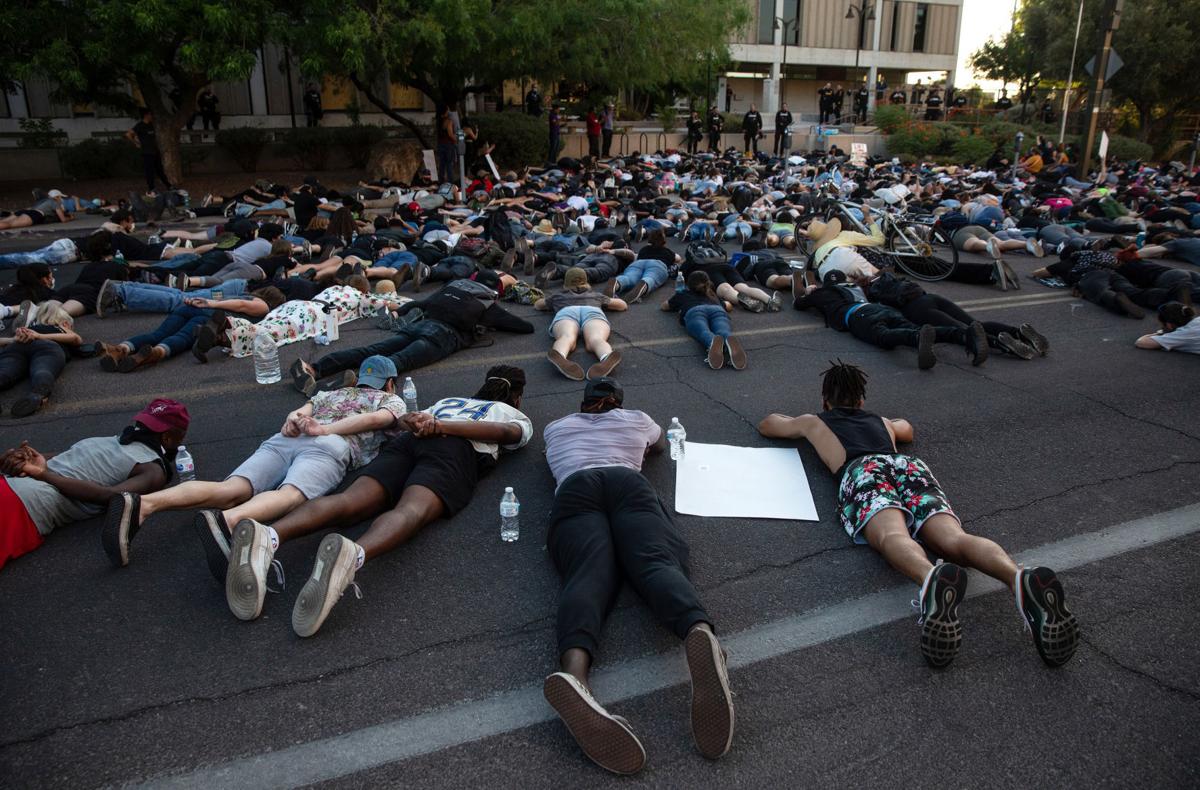PHOENIX — GOP lawmakers voted Thursday to create a new law its sponsor admitted is designed to convince people to stay away from some protests, often against police brutality.
At the same time, they approved another that some say would deter people from filing reports of such brutality in the first place.
In debates peppered with charges of racial discrimination, Republicans on the Senate Judiciary Committee agreed to create a new crime of “violent or disorderly assembly.”
House Bill 2309 would make it a felony if a person, acting with seven or more others, caused injury or property damage while engaging in a riot or an unlawful assembly.
The same panel, on the same party-line vote, approved House Bill 2550 to require that anyone filing a complaint against a peace officer be told that it is a crime to make a false or unfounded report or misrepresent a fact “for the purpose of interfering with the orderly operation of a law enforcement agency or misleading a peace officer.”
Both measures, already approved by the House with solely Republican support, now go to the full Senate.
Marilyn Rodriguez of the American Civil Liberties Union said part of the problem with HB 2309 is that it would leave it up to police to decide when a demonstration becomes an “unlawful assembly.”
“The police can declare an unlawful assembly for any reason,” Rodriguez said.
“And once they do, this bill will say that anyone standing on a sidewalk could be charged with a felony for obstructing a thoroughfare,” she said. “Someone playing music too loud could be charged with a felony for failing to abate a public nuisance.”
But the primary concern followed statements by Rep. Bret Roberts, R-Maricopa, explaining why he crafted HB 2309.
Roberts said he believes in free speech and assembly, as long as it’s done peacefully.
“Obviously, the laws that we currently have on the books in the state of Arizona and across the county are not doing what they’re intended to do,” he told colleagues.
“This bill is intended to give individuals that choose to partake in what’s supposed to be peaceful protest, to give them a moment of pause and ask themselves, ‘Do I want to attend this event? I need to ask myself, is there the potential that this could go awry and people’s livelihood and property and lives may be in jeopardy?,’” at which point they could be subject to arrest, Roberts said.
That admission alarmed attorney William Knight. He pointed out that it already is a crime to do things like riot or assault a police officer.
“The sponsor just said his intent is to ‘give people pause,’” Knight said. “So his intent is to chill people from engaging in protected speech.”
He said that will invite lawsuits like the kind already filed against Phoenix police for arrests at Black Lives Matter protests.
Sen. Martin Quezada, D-Glendale, agreed.
“He wants to pause and chill people’s ability to get out there are protest,” Quezada said. “That statement right there should immediately disqualify this bill from consideration. He wants them to not speak about the murders of people of color by law enforcement that have been happening since our country’s founding.”
The legislation is ironic, he said, in that it gives more power to police to crack down on demonstrations which often are to protest “the over-criminalization of black and brown communities.”
The other measure to require the warning about possible jail time for filing a false or misleading claim against a police officer was written by Rep. John Kavanagh, R-Fountain Hills.
Kavanagh, a former police officer, said HB 2550 is justified because more than 90% of complaints end up being unfounded.
“So I think that people should be warned to deter that type of excess,” he said.
The ACLU’s Rodriguez said the Arizona Constitution spells out that crime victims are entitled to be “free from intimidation.”
“This bill is an attempt, we believe, to intimidate victims from pursuing claims against police officers,” Rodriguez said.
Kavanagh countered that if such warnings are deterrents, then foes of his measure should demand that courts stop swearing in witnesses.
Quezada said the legislation ignores some racial realities.
“The relationship between law enforcement and most of the members of this committee is very different than the relationship between law enforcement and a Black or a brown woman, or an immigrant, or a victim,” he said to the other committee members, all of whom are Anglo.
“They are absolutely defined by intimidation,” Quezada said. “And, unfortunately, that intimidation is most often at the hands of law enforcement against those people, every single day.”
That also is his personal experience, he said.
“It is a much different situation when I see (flashing) lights behind my car than it is when any of you see lights behind your car,” Quezada said.





